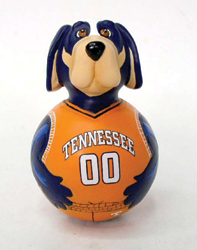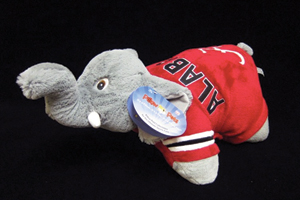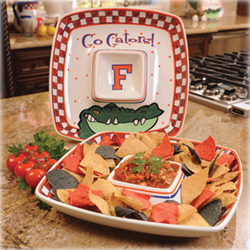Linda Gilbert, the longtime licensing chief at the University of Missouri, was stopped in her tracks on a football Saturday about 10 years ago when she saw lewd T-shirts being sold on a fraternity lot.
Gilbert approached the students and told them that they couldn’t sell the unlicensed and highly unflattering shirts, which had the marks of both Missouri and its rival, Kansas.
Emotions escalated, and campus police entered the scene. The students had made 800 shirts and they didn’t intend to surrender them. One student spit on Gilbert. Another was arrested. Eventually, those 800 shirts were carried away and burned in the school’s incinerator.
In the early days of collegiate licensing, an industry that began to take shape 30 years ago when Bill Battle founded the Collegiate Licensing Co., enforcement and trademark protection were the thrust of the business. Schools had to learn how to secure their marks.
“We’re not the bad guys,” said Gilbert, who runs trademark licensing out of the business services department at Missouri. “But we ask people if they’d use the Nike ‘swoosh’ or any other logo and they say no. Why would you use the school’s mark? That’s our brand.”
Getting universities to understand that they had a brand was one of the first steps Battle took in 1981 when he founded CLC, an Atlanta-based licensing agent that grew to represent about 200 schools, conferences and bowl games. Back then, anyone with a screen printer in his garage could crank out a T-shirt. Some were funny, some were obnoxious and some were downright distasteful.
“The schools had no control of their brand,” said Battle, who began his career by representing legendary coach Bear Bryant and Alabama, where Battle played college football. “And most schools just didn’t think there was any money in it.”
Thirty years later, the collegiate licensing industry has become a $4.3 billion business in annual retail sales. About 60 percent of it comes from apparel sales and 40 percent from non-apparel, according to CLC. Enforcement is just a fraction — albeit an important piece — of what licensing directors do now.
“What Bill did was make it easier for licensees to go to one place and get the rights to several schools,” said Finus Gaston, Alabama’s senior associate athletic director and CFO.
 |
| It’s difficult to believe now, but colleges once had to be convinced that demand existed for a range of products well beyond what could typically be found in the on-campus bookstore. |
As schools came to understand that there’s money in licensing, the industry evolved into more of a marketing machine. Product that used to be available only in the school bookstore now flies off the shelf in Wal-Mart, Target, grocery stores, convenience stores, truck stops and e-commerce sites.
“In the 13 years I’ve been in the business, it’s continued to become a bigger component of the university,” said Craig Westemeier, the trademark licensing director at Texas. “We’ve seen the administration become much more conscious of the shirts and trinkets and everything else because that’s how we’re represented.”
Mizzou’s Gilbert said trademark licensing “operated under the radar until we hit the $1 million mark about five years ago. Our administration didn’t even know we existed until then.”
After 30 years, the industry continues to develop. Gilbert is an example of a licensing chief who still works in university administration. Many others, like Texas and Kansas, have moved licensing into the athletic department.
What’s clear is that licensing has become a multifaceted business that’s much more than an enforcement activity. It’s a profit stream for the top schools in the country.
Texas made more than $10 million in royalties last year and is on pace this year to top that. The Longhorns have been the top seller among CLC schools for the last five years.
For most schools in the big six power conferences, like Missouri, a more typical revenue line from licensing is about $2 million a year.
“We eventually convinced institutions that there were a lot of people who were fans of the school that didn’t go to games and couldn’t get to the bookstore,” Battle said. “As the 1980s passed, licensing became the hot retail phenomenon. A cottage industry sprung up with magazines, trade shows, and it just grew like crazy. That was about the time that stadiums were expanding, TV was picking up more games and college sports were becoming very popular.
“We were convinced that if you could bring together enough schools, like the NFL brought together all of its teams, there was revenue to be made from it.”
CLC schools this past year represented 80 percent of annual collegiate retail sales. Its competition comes from Licensing Resource Group and, just recently, the Dallas Cowboys, whose fledgling Silver Star Merchandising secured the rights to Southern California last month. Some schools, such as Ohio State, run licensing from within their athletic department.
However it’s managed, in-house or outsourced, collegiate licensing has become more of a focal point for college administrators.
“When we first got started with this 30 years ago, some schools had taken such a beating that they thought their trademark was in the public domain,” Battle said. “They thought they couldn’t control it. One school didn’t even own the mascot because those rights had been given to the cheerleader coach who designed the mascot uniform. We ran into all sorts of things in the early days of the business. But schools have learned over the years that they can control it.”







